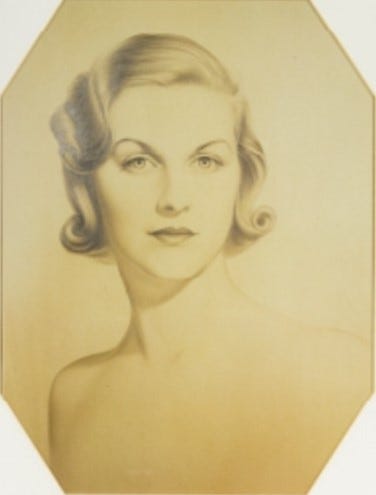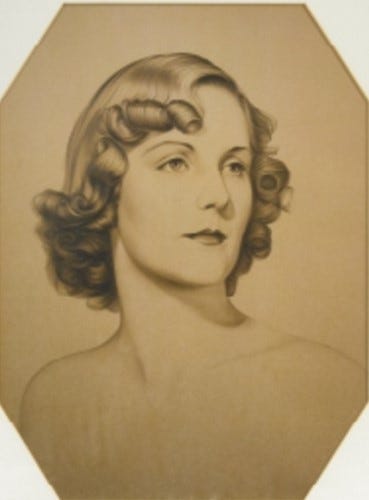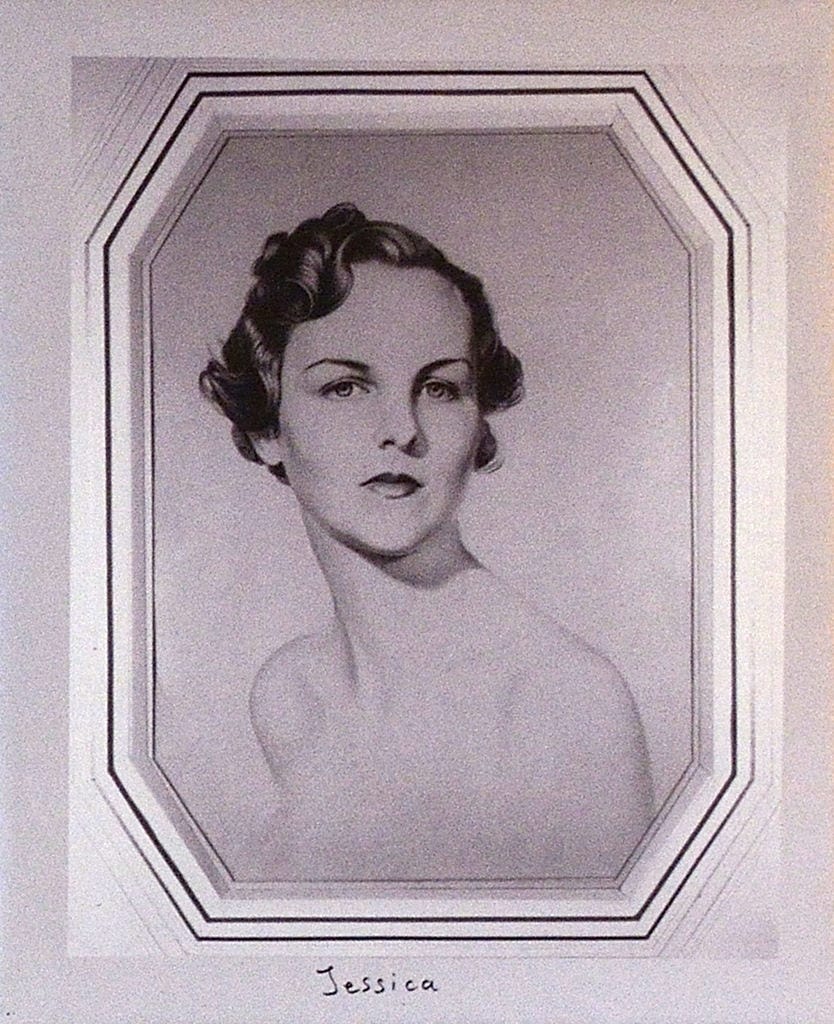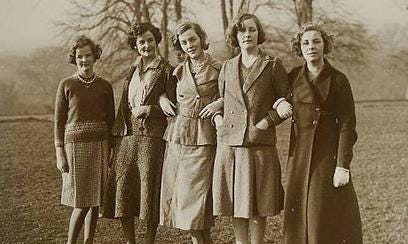Political is an Understatement: The Middle Mitfords, Diana, Unity and Jessica
A Nazi, a Fascist and a Communist…The middle three Mitford sisters were by far the most polarizing of the six.
A Nazi, a Fascist and a Communist…The middle three Mitford sisters were by far the most polarizing of the six. One sister attempted suicide, one sister ran away, and one sister left her husband, all because they were so sold out for what they believed in and who they loved. Two of these women never reconciled, one never saw her father again, and all of them were monitored by governments of multiple countries…All of the Mitford Sisters had incredibly eventful lives, but I think it is safe to say that these three had lives that are seemingly unbelievable. When I learned the stories about these three sisters in particular, I just kept thinking to myself, “Wow…I wonder how their parents felt.”
*As a note, the politics of these ladies were and are extremely polarizing. After watching many interviews with these women, their family and about these subjects I want to make it clear that I don’t condone any of their actions or share beliefs. I am simply sharing their stories and I feel that in order to accurately do that, historians of any kind must do their best to share as the subject saw things during each period in their life. I also want to stress that in the years following World War I, people around the globe were desperate for peace and stability. After the prosperous early 1920s, we know the world fell into the Great Depression. With the suffering and loss of World War I still fresh, it is not shocking that polarizing political movements sprung up around the world. Germany in particular felt that they had been pushed much too far with the Treaty of Versailles and peace agreements after WWI. When Hitler rose to prominence much of the world saw that he had pulled Germany from the Depression. For many years, he was not seen as the monster we all now know he was. One the other side, just as the idea of Fascism appealed to many, the idea of Communism appealed to others. Now that we look back, we see that in fact Communism also lead to outcomes as terrible as the Nazi Party’s regime. Joseph Stalin was responsible for as many if not more deaths than the Nazis. All of this aside, it is important to remember that none of these women, or their husbands for that matter, committed any crimes and as time went on, the surviving two sisters came to see how horrible the extremes of these political movements were.
Diana, born in 1910, was described as the undisputed beauty of the family. Interestingly, it is said that drawings and paintings captured her likeness better than film or photographs because as soon as a camera was brought around, she actually became very shy, losing the charisma that she otherwise had. She, like many of her other sisters looked at marriage as an escape from her life (although they had a very happy childhood) and so when she was just nineteen she married Bryan Guinness, the heir to the Guinness
Brewing fortune. Interestingly, Diana’s parents took some time to come around to the idea of the marriage thinking that Diana was to young, and, as her mother said, Bryan was “far to rich!” They did eventually agree to the marriage though, and Bryan became a much loved member of the Mitford Family. Just like Nancy, Diana and Bryan were members of the Bright Young Things and Diana’s first two sons, Jonathon and Desmond were born by 1931.
However this seemingly blissful life was not to last as Diana became aware of Sir Oswald Mosley, a charismatic Member of Parliament who, having grown tired of mainstream politics started the British Union of Fascists in 1932. The break up of Diana’s marriage was a major blow to her family, and to make matters even worse, she lived as Mosley’s mistress until 1936 because he, a philanderer, was still married. Diana however did not care, she was in love with him, and she herself said she just wanted to be with him and support him in any way she could. As things cooled, Bryan and Diana did remain on good terms for the rest of their lives, and she and Sir Oswald did have a very long and very happy marriage together. At the time however, things became so tense with her family that her younger sisters were not even allowed to visit her home because they had to keep their reputations in tact. It took a very long time for her parents to see her again, and over a decade for them to be around Sir Oswald.
Interestingly in 1936, Diana and Sir Oswald were married in the drawing room of prominent Nazi Jospeh Goebbles. They did associate with Nazi’s and in fact, Diana knew Hitler rather well. However Diana herself, in defense of her sister Unity, pointed out much later that although nobody in later years would admit it, many British people traveled to Germany, were interested in the Nazi party, and even knew their share of Nazis. Once the war began, a special law was put into place where people could be interned in prisons and this was the case of Diana and her husband. While neither of them ever committed a crime or were tried, because of their Nazi connections they were deemed dangerous and sent to prison. Oswald was imprisoned first, and then Diana followed just eleven weeks after having a baby that she was still breastfeeding. Letters and accounts from their time in prison detail how difficult it was, how filthy the conditions were, and how much being imprisoned in separate locations wore them down. Later, Sir Oswald shared that in many of his letters to Diana he did not want to worry her and so he chose not to share things like him being infested with fleas. Diana also suffered from dysentery, barely ate, and at Holloway, where she was kept, there was often dirty sewage and water all over the floor. Somehow, they made it through and after a year, were able to be imprisoned together which Diana described as one of the happiest days of her life. They would stay in prison until the end of 1943 when they were released on house arrest, primarily because Sir Oswald had become very ill in the prison conditions. (It should be noted that her brother Tom is largely credited with helping get the released after he dined with the Churchills.)
Following the War, the Mosleys were accepted by some, and rejected by others. Family (besides Jessica) remained close to them on the whole, and once they were able to travel out of Britain (for a long time they did not have access to passports) They spent a lot of time in Ireland, France and South Africa. Any of Sir Oswald’s political aspirations after the war were futile and they each ended up writing several books. Aside from Jessica, Diana remained close to her sisters, and when her sister Nancy was dying of cancer, she was at her side almost everyday through her battle. Interestingly, after Nancy’s death, it was revealed that Nancy had a strong hand in imprisoning Diana during the war because she twice told the British Government that Diana was dangerous. Their sister Deborah said later that she just could not understand why Nancy would do such a thing. Diana and Sir Oswald had a very happy time in their later lives, and remained married until Sir Oswald died in 1980. Diana lived a further twenty-three years and passed away after having a stroke in 2003. She was ninety-three years old.
Was Diana actually so political herself? Or did she just love a politician? I feel that she is often painted as a villain in the family. I think some of that may stem from jealousy by some of her sisters as she was incredibly stunning and popular. (Her beauty was described as being the closest living thing to Botecelli’s Venus by Mitford family friend, James Lees-Milne.) I think that some of it may stem from the fact that she, while later stating that clearly what happened during WWII was terrible, remained very honest about her dealings with Hitler, and the beliefs of her husband. While she appeared to be very unrepentant, her not watering down what happened is something I actually appreciate, because without these very honest accounts (even though it is horrifying), we would not have as accurate a picture of history.
Unity Mitford was the fourth of the Mitford daughters and is most famous for her very close friendship with Adolf Hitler. One might wonder how a girl born into British high society could become a member of the inner circle of one of the most evil men to walk the earth. And speculation has been made that, as one of the middle children in a very large and boisterous family, Unity looked for some shock value to set herself apart. She shared a room with her younger sister Jessica who had Communist views and they split the Nazi Party and Communist Party decorations right down the center. The desire to separate herself, from her siblings as well as perhaps the influence of her older sister Diana Mosley who was a Fascist, meant that from a young age, Unity fell into devoted Naszism. She convinced her parents to let her attend a finishing school for English girls in Germany because she was so fascinated with the Nazi Party and wanted to learn German. After watching Hitler speak at a rally, she decided that she had to meet him and spent her days in Munich sitting at one of Hitler’s favorite restaurants. After ten months, Hitler finally invited her to his table, and as crazy as it sounds, their friendship was born. When listening to an interview with her sister, Deborah, she talked about how when you lived at that time, before WWII, nothing seemed quite as extreme and as they saw things, Fascists were thought of as another political party. And as we know looking back today, Hitler’s Nazi government slowly worked its way into society and took over control bit by bit. Before many knew it, their government that they thought would give them a better life, was committing the most heinous and evil crimes imaginable.
Unity became so close with Hitler that she summered at the Berghof, his home in the Alps. She even appeared on the balcony with him when he announced the Anschluss, which was the annexation of the Federal state of Austria to the German Reich. As war became imminent, Hitler actually advised Unity, and her sister Diana, who was in Germany at the time, to go back to England for their safety. Diana did, and Unity, who had tried to convince Hitler to make an alliance with her beloved home country, stayed in Germany. She told Diana that if England and Germany went to war, she would not be able to handle it, and would kill herself. She was evidently a woman of her word and when the war began, she went into the gardens in Munich and shot herself in the head. She actually survived the shot and after spending time in the hospital in Germany, where Hitler regularly visited her, she went back to England. Deborah recounts how she and her mother went to retrieve Unity from the home where she had been kept and that it was horrible seeing her sister who was not at all the same person. She said they walked in to find her hair matted and bloody because Unity was not able to have her head touched after the trauma. While it is remarkable that she survived the gunshot, she did have mental issues, and a changed and juvenile personality. She was cared for by her parents (primarily her mother) until she passed away in 1948 from an infection caused by the bullet in her brain. It was thought at the time of her injury that it was better to leave the bullet in rather than remove it. Unity’s story, to me, is almost unbelievable. Now that we know how the War played out, it seems unbelievable to me that anyone with a soul could have spent any time around a man like Hitler, but again, like so much of history, we were not there.
As I said above, I feel like Diana was made out to be somewhat of a villain in her family, and what is remarkable to me is that Unity or “Bobo” as her family lovingly called her, seems to be consistently let off the hook. I can’t help but wonder if this is due to the fact that Unity had such a tragic ending to her life, or if it is due to the fact that she, according to her sisters, always possessed a sort of innocence. While she may have had some innocence, I also call that into question because she did live in an apartment that was taken from a Jewish family, and was very derogatory about anyone who didn’t fit into the ideal for the Nazi party. These actions are actually far deeper than her sister Diana ever went, yet, even from her sister Jessica who barely spoke to Diana for the rest of her life, Unity seemed to be forgiven and accepted.
Born in 1917, and politically miles away from her sisters Diana and Unity, was Jessica. From a very young age, Jessica (Or Decca as her family called her) had the urge to break out of her life as she knew it. Rather than being educated at home, Jessica begged her parents to go to school. She saved up a “running away fund” to in fact, run away from home, which she did. She was on the complete opposite end of the spectrum from her sisters Diana and Unity when it came to politics, and in fact, she remained estranged from Diana for the rest of their lives because of their different political beliefs. When she was Nineteen, she fell in love with, and married her second cousin, Esmond Romily, who was also the nephew of Winston and Clementine Churchill. Romily was a communist sympathizer and had been fighting in the Spanish Civil War before his relationship with Decca. Much to the extreme upset of her parents and her devoted younger sister Deborah, Decca and Esmond did use that “running away fund” and decided to elope.
They went back to the war in Spain and following that, settled in London’s extremely poor East End. During their time there, their five month old daughter passed away in the measles epidemic. Jessica, who was breastfeeding their baby was told by the nurse that she needn’t worry because her daughter would get her own measles antibodies through her breastmilk. Because Jessica was raised in the upper class however, she never had the measles and as a result, had no antibodies. She did catch the measles in this epidemic though and when she woke up, she came to the horrifying reality that her daughter was dying. She and Esmond fled to Corsica to deal with their grief.
In 1939, Jessica and Esmond emigrated to the US. Sadly, Esmond who joined the fight during World War II died on his way back from a bombing raid over Germany. This left Jessica a very young widow, with their second daughter, Constancia Romily to raise. Jessica focused heavily on war work while grieving her much loved Esmond and it was during this time, that she met and married her second husband, Robert Truhaft in 1943. Truhaft was a civil rights lawyer and the two of them had an additional two sons together. Tragedy would again strike Decca however when their oldest son Nicholas was hit by a bus as a child. Leaving their family with Constancia (Dinky as she was called) and Benjamin.
Together, Decca and Robert joined the Communist Party USA and were very involved until the late 1950s when they felt that the party was no longer useful and they could pursue their political work without it. Following in her family tradition, Mitford became a very acclaimed writer and published Hons and Rebels (in America it is called Daughters and Rebels) in 1960, and The American Way of Death in 1963 (she had several other books that followed). She also worked as a journalist and was in Montgomery Alabama to meet the freedom riders in 1961. It was there she escaped the KKK’s riots and fled to a rally that was being led by Martin Luther King Jr. The Church that was hosting the rally was also set upon by the KKK and Jessica, along with those in attendance of the rally had to stay barricaded in the church overnight until the Alabama National Guard was able to deal with the situation.
Decca lived the majority of her life in Oakland, CA where she eventually died in 1996. She was described by her two surviving children (who called her Decca and not Mom) as not a touchy/feely mother and as someone who had work to do, and expected them to have work to do as well. Descriptions of her from others were always positive and people said she brought a sense of occasion everywhere she went. In interviews, she comes across as very funny and she has a brightness about her that made me instantly like her. The mixture of descriptions of being witty, not touchy, and carrying herself with a sense of occasion no doubt come from her upper class upbringing, as much as she likely wanted to run from it, it was still a part of her.
Although she did see her sisters and mother after the war, and repaired their once very strained relationships (except with Diana), Jessica never saw her father after she ran away to marry Esmond. Later in his life, when asked who he wished to see most in the world, he said that he wished for Decca to walk through the door. Interestingly, as someone who begged her parents to go to school, which she was not allowed, she, because of her very successful writing career, was actually a professor and lecturer at many universities.
Through all of the political turmoil these women faced, I think it is important to remember that as much as they ran, and as much trouble as they got in, they still were who they were. They still were able to ask Winston Churchill for favors and help getting out of prison. Unity was able to be all but excused for her very close relationship with Hitler and brought back to
England to live with her mother. Jessica, who was a communist/socialist, wasn’t aware that you had to pay for heating and gas, and ran up several bills when she barely had any money. Even though these women all three wanted to be “anywhere but here” they were able to have strings pulled, and favors done, that no normal middle class person would have. I wonder if looking back, this is something that bothered them very much, or if they appreciated the help. In my mind, with some of the smaller faux pas, it is part of what helped make these women so charming. With the much more colossal decisions, I am amazed at the iron will these sisters all possessed.
If you have made it this far, thank you! And I can’t wait to share about the youngest sister Deborah, Duchess of Devonshire as well as more family stories to round out the Mitford series. Thank you for reading!
Until Next Time,
McKenzie
PS. Here is a fabulous interview with Jessica that made me chuckle.






looking forward to Part 3!
I think what I find most unsettling about Diana is on full display in the famous 1977 “Good Afternoon” interview with Mavis Nicholson: she was obviously very sharp and quick-witted, yet her attitude to Hitler was beyond unrepentant or equivocal. At one point she remarks that the funny thing was that he hardly ever talked about the Jews, the implication being, I suppose, that the Holocaust was really something entirely separate from Hitler, perhaps done in his name, but like something in a parallel or at least disconnected universe. Either she could lie at a level which was pathological, or she had somehow brought herself to believe her own version of events, and I don’t know which explanation would trouble be more.